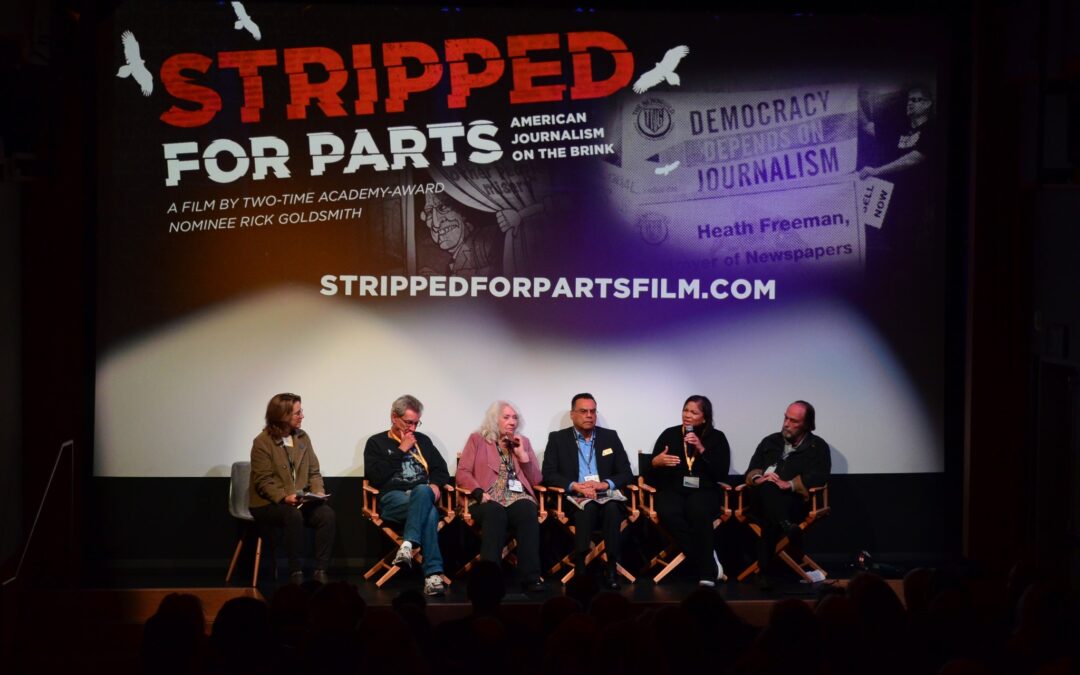
by Beth Kassab | Sep 18, 2025 | News, Uncategorized
Florida Debut of 'Stripped for Parts' Highlights Urgency to Support Local News
In a note to readers, Voice Editor Beth Kassab writes about the value of access to local news in our communities
Sept. 18, 2025
Dear Reader,
Thank you for being part of our Winter Park Voice community! If you are here, then you probably share my interest in local news and believe in its value when it comes to understanding the place where you live and work. Our mission at the Winter Park Voice is to deliver stories that you can’t find anywhere else about your city — like why electric rates are going up or down, who is influencing the county redistricting maps, how the police are doing their jobs or who’s running for local office and who is funding their campaigns (just to name a few recent stories).
We believe in the power of local news to help residents be more engaged in their communities. That’s why I want to share with you an event set to take place Sunday at the Enzian Theater, which will host the Florida debut of “Stripped for Parts: American Journalism on the Brink.”
The film tells the story of “a secretive hedge fund that is plundering what is left of America’s newspapers, and the journalists who are fighting back.”
Alden Capital purchased Tribune Publishing, which included the Orlando Sentinel, in 2021.
Since then, the Sentinel newsroom has continued its disappearing act that started long before this acquisition. That means fewer journalists to cover the stories that are most important to all of us. The Sentinel Guild is sponsoring Sunday’s screening.
“For us, this is a story we know all too well,” Cristóbal Reyes, a Sentinel reporter and the guild’s unit chairman, told me. “We’ve been on the front lines of this since we formed our union.”
Reyes said the numbers tell a startling story. When a group of reporters and photographers formed the guild in 2020, they had 54 members. Today there are just 26 left.
As one of the people who had the privilege of working at the Sentinel for 20 years, I can tell you there was no place more exhilarating than a newsroom humming on all cylinders. That old windowless second story expanse over Orange Avenue didn’t have a lick of natural sunshine. But its people with their grimey keyboards and notebooks and rolodexes channeled their energy into a bright light across Central Florida everyday in the form of a broadsheet and digital product.
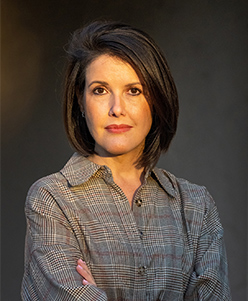
Beth Kassab
To be clear, my motivation at the Voice in 2025 isn’t nostalgia for the past — though I have plenty. The industry has changed. Hard stop. And we must move forward and find the best and most effective ways to serve our readers today.
Because what hasn’t changed is the need for access to news about your city, your neighborhood, your school and your workplace. You can take your pick of sources when it comes to scrolling headlines about national politics or the national economy.
But who is going to City Hall to listen to a debate about how much of your tax dollars go to police and how much go to preventing the next post-hurricane flood? Who is going to ask questions about the latest historic building scheduled for demolition? How will you know who is making those decisions and who paid for the campaigns that got them into office?
The Winter Park Voice is one of hundreds of small nonprofit news sites that have sprouted up across the county aiming to do that work and fill the gaps left by our shrinking regional newspapers. The Voice is part of a national network of those sites through the Institute for Nonprofit News.
And the Voice is proud to be part of the News Collaborative of Central Florida, which includes the Sentinel, Central Florida Public Media, Oviedo Community News, WKMG, VoxPopuli and more. This group, born just last year, is finding ways to partner where it makes sense to deliver more stories that otherwise might not be told.
I want to be clear about something else: The people who remain at the Sentinel and these other organizations are still doing amazing work despite the odds. I see it on their pages every single day. There just aren’t enough of them.
The Voice is trying to be part of the solution. We are working to meet the problem of a dwindling news landscape with the urgency and doggedness it demands and deserves. We provide our content for free without a paywall and subsist solely on community donations.
So if you care about stories about your community that are vetted for facts, context and history then take a moment to learn about this film or support one of the local nonprofit news organizations. We need you.
All my best,
Beth Kassab
Editor, Winter Park Voice
P.S. For more information about tickets to the film click here. The Orlando Sentinel’s Scott Maxwell will moderate a Q&A following the screening with the filmmaker and Judith Smelser, president and general manager of Central Florida Public Media. Proceeds from the event will benefit Central Florida Public Media.
WinterParkVoiceEditor@gmail.com
Hedge fund Alden Global Capital is quietly gobbling up newspapers across the country and gutting them, but no one knows why– until journalist Julie Reynolds begins to investigate. Her findings trigger rebellions across the country by journalists working at Alden-owned newspapers. Backed by the NewsGuild union, the newsmen and women go toe-to-toe with their “vulture capitalist” owners in a battle to save and rebuild local journalism in America. Who will control the future of America’s news ecosystem: Wall Street billionaires concerned only with profit, or those who see journalism as an essential public service, the lifeblood of our democracy?
To comment or read comments from others, click here →
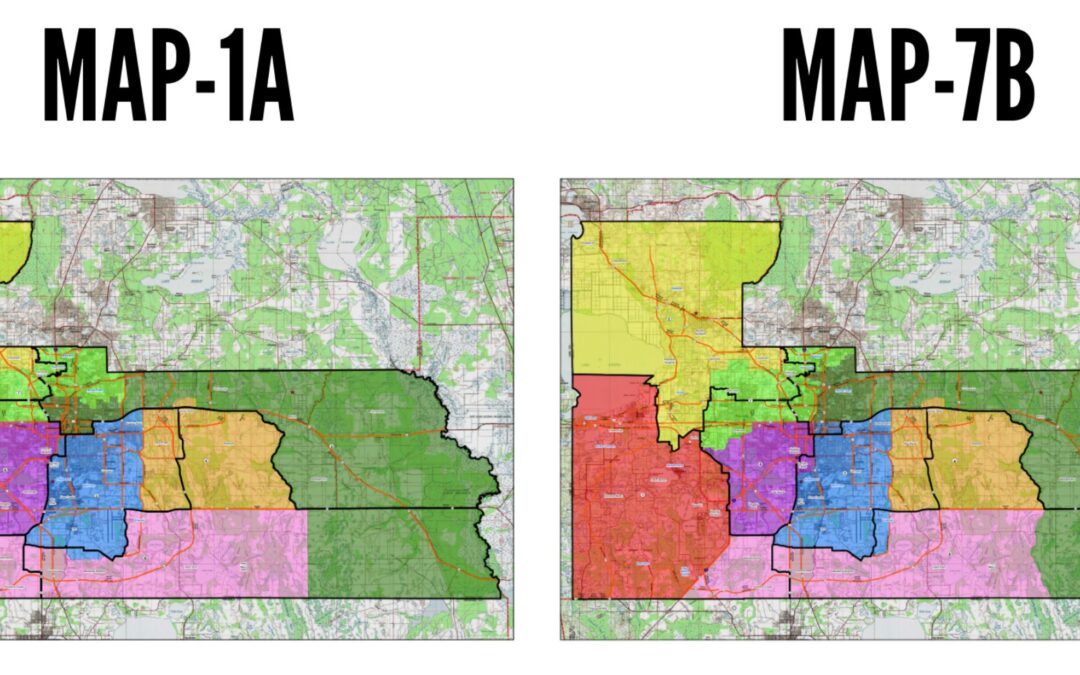
by Beth Kassab | Sep 17, 2025 | City Commission, Election, News, Uncategorized
Kelly Semrad Says She is Undecided on Redistricting Maps
Winter Park is making a hard push to move out of Semrad’s district as Orange County redraws the boundaries for how the County Commission is elected
Sept. 16, 2025
By Gabrielle Russon
Where Winter Park will land on a new map of Orange County Commission districts is still unclear as county leaders are divided on which map to pick with Kelly Martinez Semrad, who represents the city on the board, saying she is now undecided.
The commission met Tuesday in a workshop but isn’t scheduled to take a final vote until Oct. 14 on the new boundaries that are being redrawn to grow the board from six to eight commissioners elected by district. The mayor also has a vote on the board and is elected by the entire county.
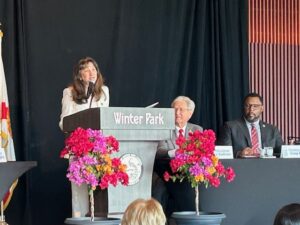
Mayor Sheila DeCiccio speaks at the 2025 State of the City event.
Winter Park city officials continue to lobby in force for the county to put the city in the newly drawn District 7 along with its neighbors Maitland, Eatonville and Pine Hills, an unincorporated neighborhood in Orange County. That option is Map-1A.
The other option, Map-7B, would keep Winter Park in the current District 5 along with rural eastern Orange County represented now by Semrad.
A redistricting advisory committee that spent months getting public feedback and looking at different options presented Map-1A and Map-7B as the final two proposals to the county board Tuesday. But the advisory committee wouldn’t go as far as picking which one it liked best, leaving that decision up to the county commissioners.
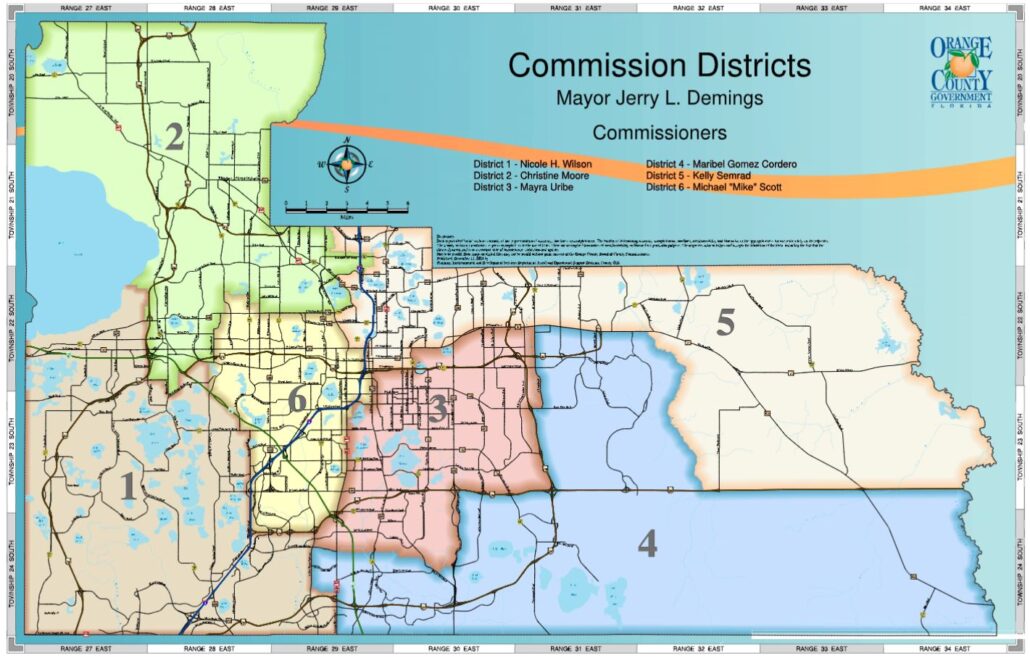
This map shows the way the five county districts stand today with Winter Park in western-most section of District 5. The above maps show the proposed changes.
Three commissioners said they supported Map-1A while two others endorsed Map-7B. Orange County Mayor Jerry Demings said he supported whatever the majority wanted.
That left Semrad — a potentially key vote and the commissioner whose district is caught up in most of the debate.
At a redistricting advisory committee meeting earlier this summer, Semrad said she initially supported a map similar to 7B to leave Winter Park in her district with the rural east and balance out the unincorporated areas with the municipalities. But Tuesday, Semrad backtracked and said she wasn’t ready to make a decision yet as she got a flurry of last-minute public feedback.
On the day of the county workshop, Semrad said she received 100 emails and hadn’t had time to review them all yet.
“I have the people in the east who really want to stay with Winter Park because they look at it as more suburban and that they have nothing in common with downtown and then I have people from Winter Park not seeing compatibility with the rural area,” Semrad said.
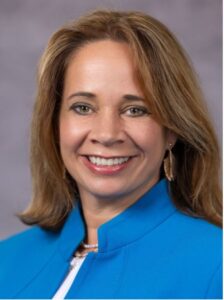
Kelly Semrad
“Does that sound like you can go with either map?” Demings asked her.
“That is the case,” Semrad said.
A delegation from Winter Park has attended the committee meetings and also spoke at Tuesday’s workshop.
Stating her case again, Winter Park Mayor Sheila DeCiccio argued her city should be districted with its Eatonville and Maitland neighbors.
They often work together, she said, pointing to Winter Park and Maitland sharing an elementary school boundary or Winter Park handling Maitland’s emergency calls. Winter Park is also working with Eatonville on a grant for new sidewalks and crosswalks.
“We have no contiguous borders with east Orange County. The gerrymandering and Map-7B to include Winter Park would make Texas proud,” she said. “There is absolutely no compatibility, collaboration, contingent border, or community between us.”
From the public, the county heard a mix of the public’s concerns as some wanted to keep the small cities together in Map-1A while others said Map 7-B made more sense.
Some people feared Pine Hills might get overpowered by Winter Park, so they preferred Map 7-B to keep Winter Park separate from the rest of the urban areas.
One Winter Park resident supported Map-7B for “a pretty selfish reason.”
“I love my county commissioner. I love Kelly Semrad,” the resident said. “During the last election cycle, we had so many people knock doors in Winter Park to understand who Kelly is and why she was a candidate for county commissioner.”
And Ella Wood, a Winter Park resident who is the political director for Unite Here Local 737 representing hospitality workers, argued Map-7B was closest to preserving the historic county boundary lines.
“It helps to maintain people’s connection, people’s engagement, and maintaining their community interests,” Wood said.
Meanwhile, Winter Park already has a city government to advocate for itself. “That’s not what we need the county commissioner to do,” Wood said.
Even though the city of Winter Park runs its own police department and handles its own infrastructure needs, city leaders still believe it’s important to get a voice on the county commission.
DeCiccio pointed to potential rail expansion, a new state law taking away local control for growth which some communities are fighting against as well as a contract with Visit Orlando — an agency that DeCiccio is not a fan of — as some of the countywide issues that Winter Park wants to advocate on at the county level. In addition, DeCiccio also brought up the Community Redevelopment Agency, or CRA, which the county allowed Winter Park to expand last year to control more tax dollars that would otherwise go to the county for projects like post-Hurricane Ian flood prevention.
“There will finally be an opportunity for someone from Winter Park, Maitland, Eatonville, College Park, or Pine Hills if Map-1A is adopted … to have a seat at the table,” she said, joined by Commissioner Craig Russell and City Manager Randy Knight to appeal to county commissioners Tuesday.
County staff and commissioners answered back at people’s concerns.
“I hear folks saying… ‘we don’t have anything in common with this group or that group of people,’” said District 6 Commissioner Mike Scott, who reminded residents they are all part of Orange County.
And would Winter Park, with its considerable wealth and tax base, dominate whatever district it ultimately lands in?
Demings looked around his board — commissioners of different races and some who had upset victories to defeat better-funded opponents or represented wealthier areas of the county.
Semrad, for example, was a political newcomer who won the seat last year against former Winter Park Mayor Steve Leary who raised significantly more money than her.
“If you’re the right candidate at the right time,” Demings said. “You can get elected.”
WinterParkVoiceEditor@gmail.com
To comment or read comments from others, click here →
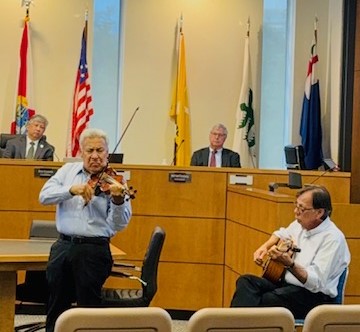
by Beth Kassab | Sep 11, 2025 | Arts and Culture, City Commission, News, Uncategorized
Electric rates go up, but bills still expected to go down
Commissioners approved a $231 million budget, prayed for Charlie Kirk and argued about whether Christmas needs saving
Sept. 11, 2025
By Beth Kassab
Commissioners approved Winter Park’s $231 million budget for 2026 on Wednesday, including a last-minute push led by Mayor Sheila DeCiccio to increase the non-fuel portion of electric rates that officials say will help the city finish the final stretch of it’s undergrounding project and replace aging transformers.
The wide-ranging meeting also included a prayer for Charlie Kirk in the moments before news alerts started hitting phones that the right-wing activist was dead, a performance by renowned violinist Alvaro Gomez and guitarist Chris Cortez and a tense exchange over a petition riddled with inaccuracies and misleading statements attempting to manufacture a war on Christmas in Winter Park.
The budget passed with little public discussion other than a final debate over electric rates, which had been adjusted dramatically from city staff’s original proposal of a 10% overall increase to a 2% increase in August based on discussion by elected officials during a commission workshop.
Ultimately, on Wednesday the board landed on a 4% overall increase after DeCiccio argued the figures from the August meeting would not be enough to finish the city’s ambitious effort to underground every power line in Winter Park.
Over the 20 years since Winter Park purchased its electric grid from Duke Energy (then Progress Energy) costs have increased significantly. About 20% of the city remains with overhead wires that are more susceptible to storm damage.
“I want to again ask for an increase of 7.5% on the non-fuel costs,” DeCiccio said. “By increasing only 3% we will have to stop undergrounding eight or nine months into the year and we won’t be complete by 2030.”
She also emphasized the need to spend millions of dollars to replace substation equipment or “the grid will fail.”
Commissioners had considered a smaller increase in rates while also taking out a bond to finance the remaining cost of the projects.
But DeCiccio argued the city should save its bonding capacity for when its agreement with Orlando Utilities Commission comes to an end and it might be able to “buy” the 600 residential customers inside Winter Park’s borders who are still serviced by OUC.
“This year the cost of fuel has decreased so the customers will not feel the impact of the rate increase, in fact, the bills may be less,” she said.
The dollar amount customers pay each month result from a complex formula of different components on the bill: how much energy a home or businesses uses; the cost of fuel (mostly natural gas in Winter Park); the city’s rates, taxes and other fees.
According to figures provided by the city on Thursday, the average residential bill for 1,300 kilowatt hours will total $171.18 in October when the new rates take effect. The average bill in August was $184.51. The decrease in the total from August to October is the result of lower fuel costs even as the city raises electric rates.
Commissioner Craig Russell supported DeCiccio’s drive for the change, he said, based on what he is hearing from residents.
“You have a contingency talking about how they don’t want rates increased, some people are talking about how they don’t want to take on any debt and they want the undergrounding done on schedule,” Russell said. “At the end of the day … it sounds like that’s what the residents want the most — the undergrounding completed.”
Commissioners Marty Sullivan and Warren Lindsey remained against the higher increase in the non-fuel portion of the bill as they had during the August workshop. They noted that the price of natural gas is volatile and could drive bills up once again.
“I’m not opposed to revisiting it in the future,” Lindsey said, noting that a rate study would soon be underway along with an analysis by the Utilities Advisory Board.
But Kris Cruzada, who was the swing voice in the August meeting for the lower rate, said he had rethought the matter and voted with DeCiccio and Russell.
The increase, he said, translated to “a small price to pay to keep the [undergrounding] ball moving.”
“We can revisit it if fuel goes up,” he said. “I just want to be ahead of the curve and this leaves us with the ability to do more things so we’re not having to play catch up.”
Inaccurate Christmas Petition
Gigi Papa, who started a petition this week claiming that Winter Park’s decades-long Christmas traditions are at risk, took to the podium during public comment to thank the more than 700 people who have signed the petition.
Papa, a frequent attendee and commenter at the public meetings who often voices conservative views, did not acknowledge that multiple statements in her petition are misleading or inaccurate. The petition titled “Save Christmas in Winter Park” appeared designed to appeal to a common right-wing talking point that liberals want to somehow shut down public use of the word “Christmas.”
“We ask that our 70 plus years of traditions continue,” Papa told the commission.
But none of Winter Park’s traditions are under threat. The city asked for the Park Avenue District, which took over coordination of the city’s main holiday decor last year, to change the name it debuted last year as the backdrop for a series of events from “Christmas on Park” to “Holidays on Park.”
Before last year, the overarching name for the decor and series of events was “Hometown Holidays.” The word “Christmas” is not being removed from any of the line-up of events such as “Christmas in the Park,” “Tuba Christmas” and “The Christmas Parade.”
The line-up also includes an event for Hanukkah and recognition of Kwanzaa. The city provides funding for the decor and asked for the more general “holiday” title out of respect for the entire line-up of events during the light display that runs from just before Thanksgiving through New Year’s.
“The petition was fraught with inaccurate information,” DeCiccio responded. “We are not departing from tradition as the petition implies … Virginia, don’t worry, Christmas is alive and well in Winter Park.”
Prayers for Charlie Kirk
After Papa talked about her petition, she asked for Pastor Weaver Blondin to join her at the podium. Blondin, of Mt. Moriah Missionary Baptist Church, was in the audience after he had given the invocation at the start of the meeting.
“I would ask the pastor to come up. We were just speaking because we had a 31-year-old person who has been advocating on college campuses and he was shot.”
Word had just started to spread about the shooting of Charlie Kirk, founder of Turning Point USA that played a significant role in rallying college-age students for President Donald Trump, as he was speaking at Utah Valley University.
Blondin approached the podium and asked DeCiccio if he could say a prayer.
“Yes, please do,” she responded.
The pastor offered a prayer for Kirk’s healing, his family and for young people on college campuses.
A short time later, major news outlets began reporting Kirk died, the latest victim of political assassination in the United States following two attempts on Trump’s life; the murder in June of Melissa Hortman, a Democratic state legislator in Minnesota, and her husband and the attempt on the life of U.S. Rep. Gabby Giffords, also a Democrat, in 2011 that took the lives of six people.
Winter Park will answer 911 for Maitland
Commissioners also approved an agreement with the city of Maitland for Winter Park dispatchers to answer calls and dispatch police and fire service for its neighboring city.
Police Chief Tim Volkerson said the agreement makes logistical sense because the agencies already work closely together and provide backup for each other.
“It really allows that turnaround time of information to be cut down significantly,” he said, noting that currently Maitland is using Apopka for dispatch service.
Maitland will pay Winter Park about $440,000 a year for the service as part of a 10-year agreement.
Blue Bamboo Performance
As part of a new effort to showcase artists in the city, Blue Bamboo founder Chris Cortez and violinist Alvaro Gomez, who has been affiliated with Rollins College, treated the commission chambers to a mini performance at the start of the meeting.
The series, which started with a vocal performance by Maria Bryant last month, is intended to display some of Winter Park’s art and cultural assets.
WinterParkVoiceEditor@gmail.com
To comment or read comments from others, click here →
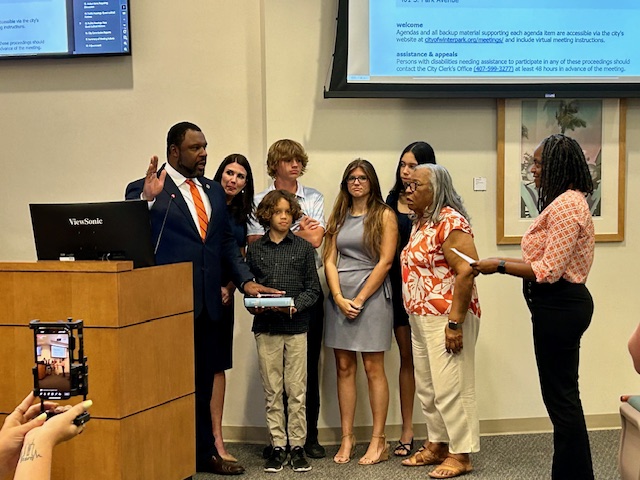
by Beth Kassab | Sep 10, 2025 | City Commission, Election, News, Uncategorized
Craig Russell to Seek Re-Election. Marty Sullivan to Retire, Leaving his Seat Open
The March 2026 election is gearing up to decide two seats on the Winter Park City Commission
Sept. 10, 2025
By Beth Kassab
Commissioner Craig Russell, a Winter Park High School teacher and coach, said he will seek re-election next year while another commissioner is retiring after two terms.
Official qualifying for the March 2026 election is still about three months away, but jockeying for the two seats is well underway.
Russell, who grew up in Winter Park, won Seat 2 in a tight runoff in April of 2024 to finish Sheila DeCiccio’s term when she became mayor.
He made history in Winter Park as the first Black commissioner to be elected in more than a century and, now at age 44, is still the youngest person on the commission today.
Russell has blazed a trail in another way, too. He was heavily backed by business leaders and the political action committee affiliated with the Winter Park Chamber of Commerce, but has steadily defined himself as a policy maker who is carving his own agenda with unpredictable votes when it comes to budget and policy issues.
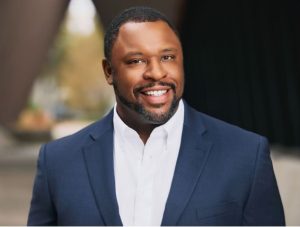
Craig Russell
Winter PAC spent about $30,000 to advocate for him in 2024 and he raised about $100,000 through his own campaign account.
“I don’t just work for one group,” he said. “I work for the residents and the businesses. I work for the entire community.”
Part of what he does, he says, is reach out to “the doubters and talk to them.”
For example, he said he heard “a lot of feedback” after he was one of two votes this summer, along with Commissioner Marty Sullivan, against keeping the city’s property tax millage rate the same. The two men voiced support for a property tax increase.
“I’ve listened to the people and I felt as though investing in the future would benefit the city best,” he said. “I got a lot of feedback and it was mixed, they were kind of surprised and wanted to know, ‘what’s your mindset?’ And I told them and they respected and understood that.”
In another recent discussion, Russell and DeCiccio were two voices who expressed support for a larger increase to electric rates this year to raise capital for infrastructure projects such as undergrounding and equipment replacement. But they were outweighed by the three other commissioners who wanted a smaller increase.

Marty Sullivan
Russell has also spent considerable time advocating for youth on the commission. He helped re-establish a Youth Advisory Council that includes students from Winter Park High, Trinity Preparatory and others.
The group is beginning to meet in the City Commission Chambers and, eventually, will provide reports to the commission on issues that are important to them such as sustainability.
It’s a chance, he said, for students to learn how local government works and also make an impact on decisions.
“They understand the decisions that are made now affect them,” Russell said. “It’s super important to them to understand how that process works.”
Russell is also outspoken on safety and, potentially setting standards, for micro-mobility because he sees electric scooters and bikes, and a fair share of accidents, as students come and go from school. Some of those can move as fast as a car but with kids not old enough to drive in control.
“I’ve seen the broken arms … the road rash,” he said. “The trends are now trickling down to the e-scooters are at the elementary and middle schools and at high school we have the new drivers and the electric bikes — they aren’t bicycles and they aren’t motorcycles they are in between.”
Last year he worked with the police department on a series of educational safety videos and more are in the works this year.
As for his campaign, he said he hopes to continue to broaden his support from 2024.
“I hope to have more support from everybody,” Russell said. “I hope to have support from previous supporters and I hope to have new supporters.”
A spokeswoman for Winter PAC, which supported him last time around, declined to comment on who its leaders will support for either seat in 2026.
Sullivan, a geotechnical engineer who sits in Seat 1, said two terms on the commission have allowed him to accomplish a great deal and won’t seek re-election.
“Six years is enough I believe for doing what I can do for the city,” he said.
He pointed to the expansion of the Community Redevelopment District, which will allow the city to set guideposts for new development near Interstate 4, as one accomplishment.
He is also pleased that there is a new use in the old library building as The Blue Bamboo Center for the Arts has brought a burgeoning music scene there.
He said he was pleasantly surprised to find several commonalities in policy mindset with Russell such as the vote to allow Blue Bamboo and even the idea of a potential tax increase.
“My concern was never to be re-elected,” Sullivan said. “My concern is to do what’s right and if the citizens disagree with me I would have been fine with losing. And I think [Russell] takes that same approach because he has not adhered to the way of thinking that his supporters thought he would, I don’t believe.”
Only one candidate has officially filed paperwork to open a campaign account so far, according to the city clerk’s office.
Elizabeth Ingram, 38, grew up in Winter Park and is a long time resident and community leader. The trained opera singer currently serves on the Public Art Advisory Board is and seeking Sullivan’s seat.
WinterParkVoiceEditor@gmail.com
To comment or read comments from others, click here →

by Beth Kassab | Sep 9, 2025 | Arts and Culture, City Commission, Events, News, Uncategorized
Save Christmas? Petition is misleading
City officials asked the Park Avenue District to brand the season of events as “holiday,” but Christmas is not disappearing from the names of the individual events
Sept. 9, 2025
By Beth Kassab
Hold your reindeer, Winter Park. Before you get fired up about the Change.Org petition to “Save Christmas in Winter Park,” let’s take a look at the facts.
The petition, which had 570 signatures by Tuesday afternoon in the city of 30,000 people, makes several allegations, asserting that 70 years of Christmas event traditions are “at risk.”
“In recent planning, the city has agreed to fund holiday lighting only if the word “Christmas” is removed,” the petition states. “As a result, Central Park’s Christmas Tree is now called a ‘Holiday Tree,’ and the annual tree lighting event has been rebranded as ‘Winter on the Avenue,’ intentionally avoiding any mention of Christmas.”
But those statements are misleading and, in some parts, false.
The city is, in fact, asking for the overall name of the events season to change. But no changes are being requested for the titles of the half dozen main events that make up the season — and most of those use the word “Christmas.”
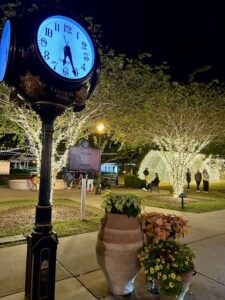
New lights in Central Park made up part of the city’s display in 2024.
Gigi Papa, a Winter Park resident who frequently attends and speaks at City Commission meetings, is listed on the change.org page as the “petition starter.” Papa did not immediately respond to an email and text message seeking comment about the petition’s statements.
Here’s what happened and why the city requested the change:
In 2024, the Park Avenue District, a relatively new group of merchants, businesses and residents who aim to support the central retail hub, took over coordination of the city’s annual light display and decor.
With about $100,000 from the city government and matching dollars from private donors, the group added more lights, an Instagram-worthy walk-through light cathedral in Central Park, a children’s carousel in front of City Hall and new wreaths and other festive touches.
For years, the city used the name “Hometown Holidays,” to advertise its season of events that run from mid-November, when the display goes up, through New Year’s.
The Park Avenue District changed the name to “Christmas on Park” last year.
City spokeswoman Clarissa Howard said Mayor Sheila DeCiccio heard some complaints about the entire season of events being branded as “Christmas” after it had been branded as “Hometown Holidays” for so long. So the city, which is providing about $60,000 for the decor this year, requested the name be changed to “Holidays on Park.”
“We are not breaking tradition,” Howard said. “It’s a season, it’s not one event. We called the season Hometown Holidays because there are holidays other than Christmas happening downtown.”
In 2021, the city added to Central Park a menorah for Hanukkah and a kinara for Kwanzaa.

A menorah is part of the annual lights display in Central Park.
Carina Sexton, executive director of the Park Avenue District, said she expects the name will change based on the city’s request.
“Regardless of the name, we feel confident that the magic of the season will remain the same and we are thrilled to welcome our community and visitors alike back to the Park Avenue District to celebrate with us,” she said.
Individual long-standing city events with the name Christmas aren’t changing and no one from the city has asked for them to be changed, Howard said. Sexton confirmed she has not received any other requests for changes.
Those events include:
“Christmas in the Park” on Dec. 4 is the annual evening that features a display of lighted Tiffany glass windows from the Morse Museum and Christmas music from the Bach Festival Society and a brass ensemble.
“The Christmas Parade” will be on Dec. 6, which is sponsored by the Winter Park Chamber of Commerce.
And “Tuba Christmas,” another musical event, will take place on Dec. 20 this year.
The name “Winter on the Avenue,” another event lead by the chamber, has been used for years and is not part of a rebrand as the petition alleges.
That will take place on Dec. 5 this year and is described on the Chamber website: “Begin the evening at the Annual Holiday Tree Lighting in Central Park just east of the Winter Park train station. Winners of the Holiday Art Competition will be recognized, Rabbi Dovid Dubov of Chabad Orlando will do a menorah lighting ceremony ushering in the season of Chanukah, and Winter Park Mayor Sheila DeCiccio will lead us in a countdown as we light the Christmas Tree.”
The petition demands the city “return to using the name Christmas Tree instead of Holiday Tree,” even though the chamber’s description explicitly refers to the mayor leading the lighting of the “Christmas Tree.”
“The city does not call it a ‘holiday tree,'” Howard said.
In holiday press releases dating back to 2005, the ceremony has always been referred to simply as the “annual tree-lighting” without the word Christmas. Though Christmas was, and still is, included in many of the event names throughout the seasonal lineup.
“We can’t return to doing something that we haven’t done,” Howard said. “There is no tradition at risk. All of our events are still happening.”
In a press release in August about the light display that will go up Nov. 13, the city noted the season of events and decor brought in about 350,000 people last year, about 7% higher than the previous year.
WinterParkVoiceEditor@gmail.com
Correction: An earlier version of this story stated the wrong year the city added a menorah and kinara to Central Park, due to incorrect information provided to the Voice. The year was 2021.
To comment or read comments from others, click here →
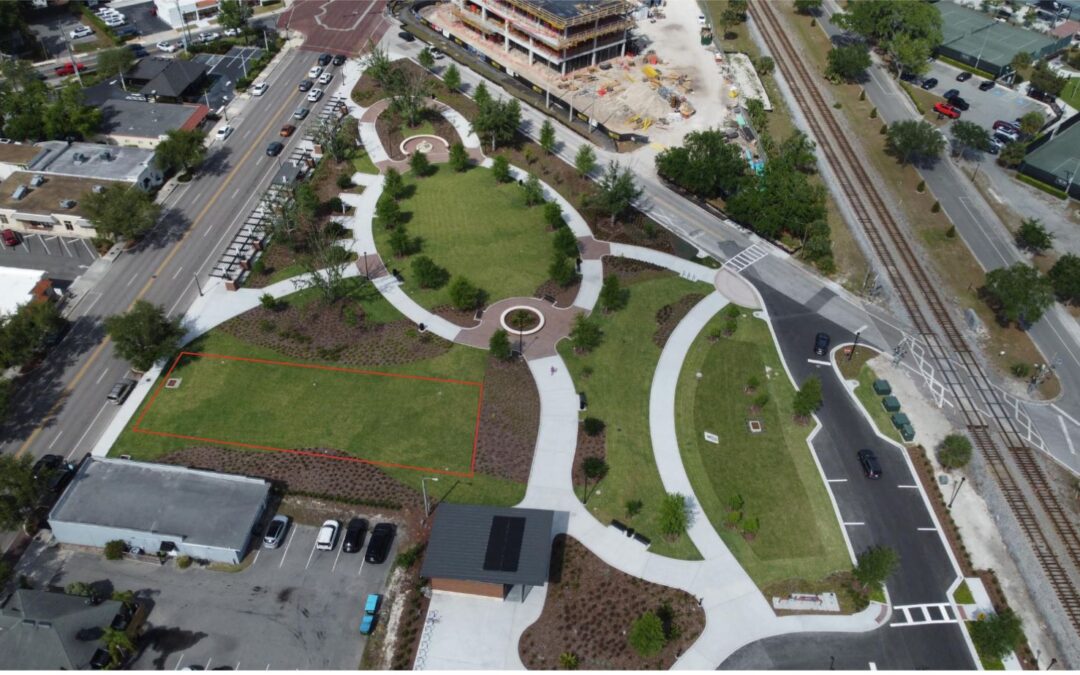
by Beth Kassab | Aug 14, 2025 | City Commission, News, Uncategorized
Playhouse gets lease and city looks for Seven Oaks Park developer
The City Commission also took steps to limit residential pickleball courts
Aug. 14, 2025
By Beth Kassab
The Winter Park Playhouse is closer to its goal of starting a $10 million renovation of the professional musical theater, which includes the purchase of the building by the city.
On Wednesday, the City Commission approved two critical steps — the funding agreement for Orange County to provide $8 million through a grant of tourism tax dollars and a lease agreement with the city to rent the building for $1 a year.
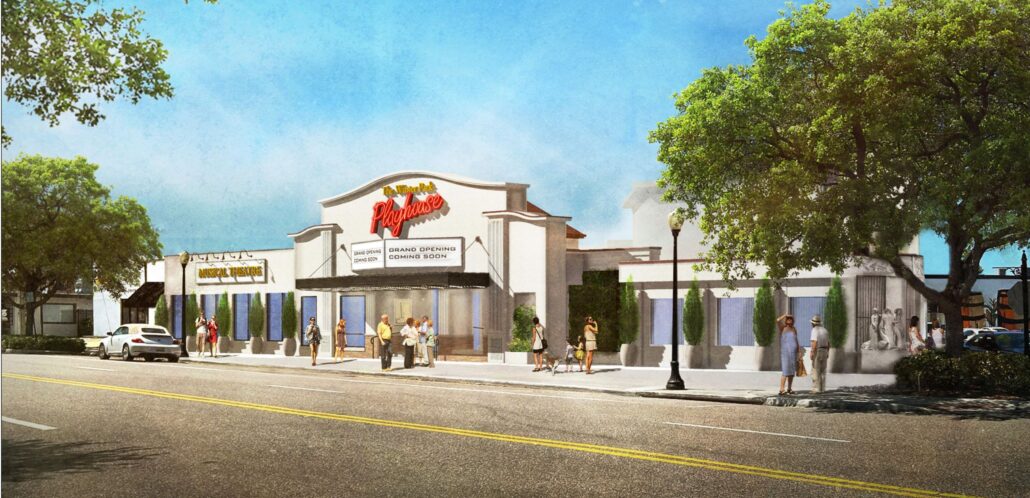
A rendering shows the proposed renovations for the Winter Park Playhouse.
The lease also allows the playhouse to request up to a $600,000 “bridge loan” if it has not met its private fundraising requirement of $1.6 million to receive the county dollars at the start of the project. The playhouse must show it’s raised at least $1 million to request the loan.
“A lot of faith there,” Commissioner Marty Sullivan said. “But I’ve got faith in the playhouse to make this work.”
Heather Alexander, co-founder and executive director, said the playhouse has already secured $1 million in private funds toward the goal and has pledges totaling more than $600,000 set to come in over the the next three to four years.
“We will be just fine … so don’t worry we won’t be able to pay it back,” Alexander told the commission. “It may not even be necessary, that’s my hope.”
The city will use $3.8 million of the county grant to purchase the property at 711 N. Orange Avenue. The remainder of the county grant will go toward refurbishing the theater, including expanding seating by 50%.
The future of the 23-year-old nonprofit theater was up in the air just a year ago when the owner of its building said its lease would end and the building would be sold. That left theater supporters scrambling for a new home until, ultimately, the city agreed to buy the property through the grant.
As part of the agreements, the playhouse will be required to provide a report on its performance metrics each year to the city.
City seeks developer for Seven Oaks Park
Tired of seeing little use of Seven Oaks Park, which opened in January, the city is inviting developers to submit ideas to build out a pad within the park that would potentially draw more people to the greenspace. (Red outline in above photo at top of page.)
Permitted concepts could include “bars, taverns, and cocktail lounges (with at least 51% of revenue derived from food sales); bicycle shops; breweries and distilleries (with food service); corner stores (excluding convenience stores); fine arts museums; instruction in fine arts, dance, and music; food halls; health and wellness studios; recreational facilities; restaurants (including fast-casual and fine dining); retail businesses; specialty food and beverage markets; and theaters for film, music, or performing arts.”
The city won’t be obligated to accept any of the ideas, but can use the “invitation to negotiate” as way to feel out interest in the project, City Manager Randy Knight said.
“The city expects this redevelopment will respect and grow the quality of the city’s unique attributes and special features of Winter Park while remaining relevant to today’s social gathering places like Foxtail Coffee Co. and Shady Park in Winter Park, Plant Street Market/Brewery in Winter Garden, East End Market in Orlando, and Boxi Park in Lake Nona,” the document reads.
Mayor Sheila DeCiccio said the neighbors and other businesses “desperately” want something to happen there.
Commissioner Craig Russell agreed, saying that despite the controversy related to the park, “I think the spirit of this park was deliberately designed for this process … it was what the plan was and I think it’s time.”
Commissioner Warren Lindsey suggested a shaded area might be a good component of whatever development plans take shape considering the Florida heat the years it will take for the park’s oaks to mature.
New limits on residential pickleball
Residents who are looking to build a pickleball court on their property will find it hard, or maybe impossible, to do so under new rules imposed by the City Commission.
The rules, which are designed to prevent noise complaints related to the game’s trademark near-constant ball whacks, will not affect commercial or public pickleball courts.
Planning Director Allison McGillis estimated there are fewer than five residential courts in the city, though some homeowners may seek to convert tennis courts to pickleball over time.
“I don’t foresee a lot of them popping up, but it’s becoming more popular,” she said.
McGillis proposed changing city code to require pickleball courts have 20-foot setbacks from the rear and side property lines, an increase from the required 10 feet for tennis courts.
But commissioners opted to increase the requirement to 150 feet, meaning new courts would be virtually impossible for now given the size of most lots.
One private pickleball court is expected to be built just off Park Avenue and Morse Boulevard as part of a private residence attached to a coffee shop. But that court would not be impacted by the new rules because of a special variance given to the project.
WinterParkVoiceEditor@gmail.com
To comment or read comments from others, click here →
















Recent Comments